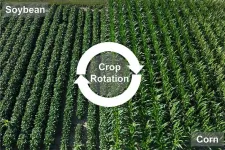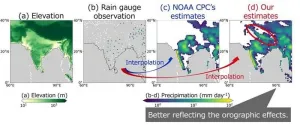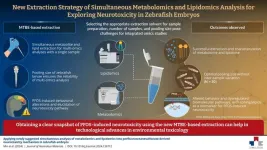(Press-News.org) MINNEAPOLIS / ST. PAUL (01/15/2024) — A study by researchers at the University of Minnesota Twin Cities offers new insights into how alternating corn and soybean crops can help increase crop yield in a changing climate.
The research is published in the peer-reviewed scientific journal Global Change Biology.
Rising temperatures and weather extremes are threatening global food security, making it crucial to understand how sustainable practices like crop rotation can help improve agricultural yields and resilience.
The study found that the benefits to corn-soybean rotation, compared to continuous corn year after year, are extremely sensitive to climate. For example, corn benefits from a rotation of soybeans in colder areas, while soybean benefits from a rotation of corn in warmer regions. In addition, warming during the non-growing season reduces the corn benefits, while warming in the growing season helps boost the soybean benefits.
“Corn and soybeans may experience different crop rotation benefit changes in the future, which can help U.S. farmers make more informed decisions when facing climate warming,” said Junxiong Zhou, Ph.D. candidate in University of Minnesota’s Department of Bioproducts and Biosystems Engineering (BBE) and first author on the paper.
Despite climate challenges, the study suggests increasing crop rotation can still improve overall yields and highlights its potential as a climate adaptation strategy.
While most prior studies have focused on the current climate conditions, this new study takes into account a changing climate in the future and how crop rotation is impacted by it. To address this, the researchers used satellite data combined with what they call a “causal forest model,” a scientific method that helps to understand cause-and-effect relationships in data. They estimated the benefits of crop rotation under varying climate conditions in the Midwest region of the United States.
“Millions of satellite observations and advanced machine learning models enable us to quantify the climate impacts on crop rotation benefits at the subfield level over the Midwest,” said Zhenong Jin, an associate professor in BBE and senior author on the paper.
To analyze this enormous amount of data, the researchers used an advanced machine learning tool that teaches computers to learn from examples and improve at tasks without being explicitly programmed. This helped the team understand how crop rotation benefits corn and soybean yields in the U.S. Midwest.
“This study demonstrates the great potential of interpretable machine learning for estimating large-scale effects of agricultural management practices,” said David Mulla, a professor and Larson Endowed Chair in soil and water resources at the U of M’s College of Food, Agricultural and Natural Resource Sciences, and a senior researcher at the AI Institute for Climate-Land Interactions, Mitigation, Adaptation, Tradeoffs and Economy (AI-CLIMATE).
In the future, the researchers hope to expand their analysis to include long-term diverse crop rotation systems and their interactions with all season climates. Future studies will work to focus on field-level studies to understand nutrient cycling and pest dynamics under varying climate scenarios, alongside exploring advancements like pest-resistant crops.
In addition to Jin and Zhou, the research team included Peng Zhu from The University of Hong Kong along with Dan M. Kluger and David B. Lobell from Stanford University.
This research is supported by the National Science Foundation (NSF) Smart and Connected Community project and the U.S. Department of Agriculture’s (USDA) National Institute of Food and Agriculture AI-CLIMATE project.
Read the entire research paper titled, “Changes in the Yield Effect of the Preceding Crop in the US Corn Belt Under a Warming Climate,” visit the Wiley Online Library website. A commentary piece on the research can also be found on the Wiley Online Library website.
END
New study shows that corn-soybean crop rotation benefits are extremely sensitive to climate
Understanding sustainable practices could help improve yields as climate extremes threaten global food security
2025-01-15
ELSE PRESS RELEASES FROM THIS DATE:
From drops to data: Advancing global precipitation estimates with the LETKF algorithm
2025-01-15
With the increase in climate change, global precipitation estimates have become a necessity for predicting water-related disasters like floods and droughts, as well as for managing water resources. The most accurate data that can be used for these predictions are ground rain gauge observations, but it is often challenging due to limited locations and sparse rain gauge data. To solve this problem, Assistant Professor Yuka Muto from the Center for Environmental Remote Sensing, Japan, and Professor Shunji Kotsuki of the Institute for Advanced Academic Research, Center for Environmental Remote Sensing, ...
SeoulTech researchers propose a novel method to shed light on PFOS-induced neurotoxicity
2025-01-15
The term “omics” refers to the study of entirety of molecular mechanisms that happen inside an organism. With the advent of omics technologies like transcriptomics, proteomics, metabolomics, and lipidomics, our understanding of molecular pathways of toxic environmental pollutants has deepened. But most environmental toxicology studies are still dependent on a single-omics analyses, leading to gaps in our understanding of integrated toxicity pathways of pollutants. Researchers from all over the world have ...
Large-scale TMIST breast cancer screening trial achieves enrollment goal, paving the way for data that provides a precision approach to screeninge
2025-01-15
The Tomosynthesis Mammographic Imaging Screening Trial (TMIST) has reached its enrollment goal of 108,508 women, as announced today by the ECOG-ACRIN Cancer Research Group (ECOG-ACRIN). The study, funded by the National Cancer Institute (NCI), one of the National Institutes of Health, will now proceed with the completion of regularly scheduled mammograms and follow-up on all participants through 2027. Key in this follow-up is the collection of biospecimens and data that will help researchers learn how to personalize breast cancer screening for women.
Participants in TMIST were randomly ...
Study published in NEJM Catalyst finds patients cared for by MedStar Health’s Safe Babies Safe Moms program have better outcomes in pregnancy, delivery, and postpartum
2025-01-15
WASHINGTON - Women who were cared for by the MedStar Health D.C. Safe Babies Safe Moms program (SBSM) have better outcomes in pregnancy, delivery, and postpartum, according to a study published today in NEJM Catalyst Innovations in Care Delivery. Additionally, the study showed that Black patients cared for by SBSM were also less likely to have low or very low birthweight babies or preterm birth than Black or White patients who received prenatal care elsewhere.
Compared to patients who received prenatal care elsewhere, patients cared for under Safe ...
Octopus arms have segmented nervous systems to power extraordinary movements
2025-01-15
Octopus arms move with incredible dexterity, bending, twisting, and curling with nearly infinite degrees of freedom. New research from the University of Chicago revealed that the nervous system circuitry that controls arm movement in octopuses is segmented, giving these extraordinary creatures precise control across all eight arms and hundreds of suckers to explore their environment, grasp objects, and capture prey.
“If you're going to have a nervous system that's controlling such dynamic movement, that's a good way to set it up,” said Clifton Ragsdale, PhD, Professor of Neurobiology at UChicago and senior author ...
Protein shapes can help untangle life’s ancient history
2025-01-15
The three-dimensional shape of a protein can be used to resolve deep, ancient evolutionary relationships in the tree of life, according to a study in Nature Communications.
It is the first time researchers use data from protein shapes and combine it with data from genomic sequences to improve the reliability of evolutionary trees, a critical resource used by the scientific community for understanding the history of life, monitor the spread of pathogens or create new treatments for disease.
Crucially, the approach works even with the ...
Memory systems in the brain drive food cravings that could influence body weight
2025-01-15
PHILADELPHIA, PA (January 15, 2025) - Can memory influence what and how much we eat? A groundbreaking Monell Chemical Senses Center study, which links food memory to overeating, answered that question with a resounding “Yes.” Led by Monell Associate Member Guillaume de Lartigue, PhD, the research team identified, for the first time, the brain’s food-specific memory system and its direct role in overeating and diet-induced obesity.
Published in Nature Metabolism, they describe a specific population of neurons in the mouse brain that encode memories for sugar and fat, profoundly impacting food intake and body ...
Indigenous students face cumbersome barriers to attaining post-secondary education
2025-01-15
Indigenous students identified inadequate funding as a major barrier to completing post-secondary education according to a new study published in AlterNative: An International Journal of Indigenous Peoples.
The study surveyed Indigenous university students at Algoma University. The students, who identified as either First Nations or Métis, reported that they required multiple sources of funding, including government student loans and personal savings, to afford their post-secondary education. About two-thirds (69%) of students received funding for their education from First Nations sources, including funding from federal programs for Indigenous students.
“This ...
Not all Hot Jupiters orbit solo
2025-01-15
Hot Jupiters are giant planets initially known to orbit alone close to their star. During their migration towards their star, these planets were thought to accrete or eject any other planets present. However, this paradigm has been overturned by recent observations, and the final blow could come from a new study led by the University of Geneva (UNIGE). A team including the National Centre of Competence in Research (NCCR) PlanetS, the Universities of Bern (UNIBE) and Zurich (UZH) and several foreign universities has just announced the existence of a planetary system, WASP-132, ...
Study shows connection between childhood maltreatment and disease in later life
2025-01-15
University of Birmingham venture Dexter has demonstrated the power of its Dexter software platform in a study showing that people whose childhoods featured abuse, neglect or domestic abuse carry a significantly increased risk of developing rheumatoid arthritis or psoriasis in later life.
The starting point for the recently published study was a database of over 16 million Electronic Health Records, from which the Dexter software defined a cohort, one arm that was exposed to childhood maltreatment, and one arm that was not.
The software then checked the records over a 26-year period ...
LAST 30 PRESS RELEASES:
Cost of copper must rise double to meet basic copper needs
A gel for wounds that won’t heal
Iron, carbon, and the art of toxic cleanup
Organic soil amendments work together to help sandy soils hold water longer, study finds
Hidden carbon in mangrove soils may play a larger role in climate regulation than previously thought
Weight-loss wonder pills prompt scrutiny of key ingredient
Nonprofit leader Diane Dodge to receive 2026 Penn Nursing Renfield Foundation Award for Global Women’s Health
Maternal smoking during pregnancy may be linked to higher blood pressure in children, NIH study finds
New Lund model aims to shorten the path to life-saving cell and gene therapies
Researchers create ultra-stretchable, liquid-repellent materials via laser ablation
Combining AI with OCT shows potential for detecting lipid-rich plaques in coronary arteries
SeaCast revolutionizes Mediterranean Sea forecasting with AI-powered speed and accuracy
JMIR Publications’ JMIR Bioinformatics and Biotechnology invites submissions on Bridging Data, AI, and Innovation to Transform Health
Honey bees navigate more precisely than previously thought
Air pollution may directly contribute to Alzheimer’s disease
Study finds early imaging after pediatric UTIs may do more harm than good
UC San Diego Health joins national research for maternal-fetal care
New biomarker predicts chemotherapy response in triple-negative breast cancer
Treatment algorithms featured in Brain Trauma Foundation’s update of guidelines for care of patients with penetrating traumatic brain injury
Over 40% of musicians experience tinnitus; hearing loss and hyperacusis also significantly elevated
Artificial intelligence predicts colorectal cancer risk in ulcerative colitis patients
Mayo Clinic installs first magnetic nanoparticle hyperthermia system for cancer research in the US
Calibr-Skaggs and Kainomyx launch collaboration to pioneer novel malaria treatments
JAX-NYSCF Collaborative and GSK announce collaboration to advance translational models for neurodegenerative disease research
Classifying pediatric brain tumors by liquid biopsy using artificial intelligence
Insilico Medicine initiates AI driven collaboration with leading global cancer center to identify novel targets for gastroesophageal cancers
Immunotherapy plus chemotherapy before surgery shows promise for pancreatic cancer
A “smart fluid” you can reconfigure with temperature
New research suggests myopia is driven by how we use our eyes indoors
Scientists develop first-of-its-kind antibody to block Epstein Barr virus
[Press-News.org] New study shows that corn-soybean crop rotation benefits are extremely sensitive to climateUnderstanding sustainable practices could help improve yields as climate extremes threaten global food security







